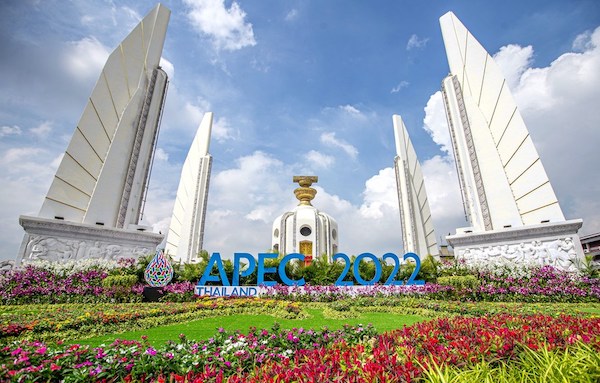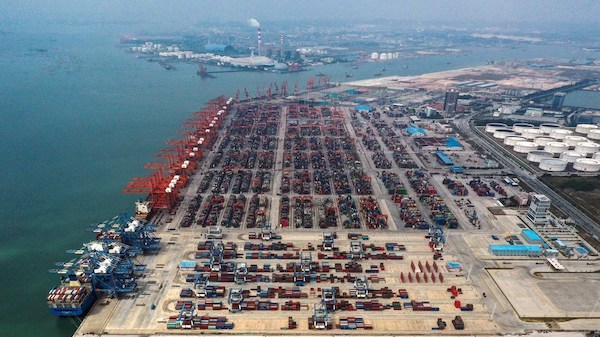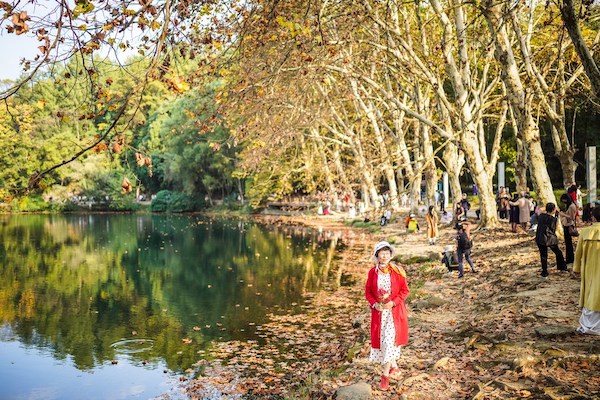Chinese modernization means opportunities for world
BEIJING -- Since the Communist Party of China (CPC), the world's largest Marxist governing party, enshrined "Chinese modernization" into its Constitution approximately a month ago, the key term defining China's journey to rejuvenation has been garnering global attention.
As the world faces unprecedented challenges and humanity stands at new crossroads, the concept of Chinese modernization and its significance were highlighted at the 17th Group of 20 Summit, which just concluded in Indonesia, and at the 29th Asia-Pacific Economic Cooperation Economic (APEC) Leaders' Meeting in Thailand.

A logo of APEC 2022 is pictured on a street in Bangkok, Thailand, Nov. 16, 2022. (Xinhua/Wang Teng)
A modernized China will be an opportunity for the world. Chinese modernization is the modernization of over 1.4 billion people -- a number higher than the combined population of all developed countries in the world today. China has set the goal to increase its middle-income population to more than 800 million in the next 15 years, and promote the sustained growth of its super-sized market.
The modernization of the world's most populous country will provide peace, immense development opportunities, greener agendas and other brand-new options for modernization.
One of the defining features of Chinese modernization is peaceful development. As the leadership of China has pledged many times over, the country will not tread the old path of war, colonization and plunder, but will instead strive to safeguard world peace and development as it pursues its own development.
There can be no development without peace. In a world plagued by regional turmoils and conflicts in various forms, stability and peace are rare public goods.
China's route to peaceful development is derived from the nation's cultural genes, which value peace, and from a profound understanding of the prerequisites to accomplishing China's development objectives, according to Liu Jianxing, deputy director of the International Cooperation Center of the National Development and Reform Commission, at a recently held symposium.
One example of China's commitment to peaceful development is the Global Security Initiative (GSI) it proposed, which has brought new impetus to world peace and development.
Since the launch of the GSI this April, the Chinese solution to global security challenges has gained appreciation and support from over 70 countries, advocating a vision of common, comprehensive, cooperative and sustainable security. It endeavors to create a new path to security that features dialogue over confrontation, partnership over alliance, and win-win cooperation over zero-sum games, and brings more stability and positive energy to the world.
Chinese modernization is the modernization of a huge population and of common prosperity for all. The world's largest developing country's effort to meet the people's aspirations for a better life also means opportunities for the rest of the world.
Figures speak. China's contribution to global economic growth averaged 38.6 percent during the 2013-2021 period, higher than the contributions of all Group of Seven countries combined, according to data from the World Bank.
Foreign direct investment (FDI) in the Chinese mainland, in actual use, expanded 14.4 percent year on year to nearly 1.09 trillion yuan, or, in U.S. dollar terms, up 17.4 percent year on year to 168.34 billion dollars, in the first 10 months of 2022, according to the Ministry of Commerce.

This aerial photo taken on Nov. 3, 2022 shows a view of Qinzhou Port in Qinzhou, south China's Guangxi Zhuang Autonomous Region. (Xinhua/Zhang Ailin)
Huge investment opportunities lie behind the country's domestic policies and modernization drives, such as rural vitalization and the new development paradigm of "dual circulation."
Chinese leaders have welcomed countries around the world to "get on board the express train of China's development." In a country that has been reiterating that it will not change its determination to open up at a higher level, multinationals, which are expanding their footprints in China's thriving traditional and digital economies, will surely find more development opportunities.
Chinese modernization is the modernization of harmony between humanity and nature.
According to the International Energy Agency, China leads the world in the purchasing of electric vehicles, whose sales in China last year were more than the combined global total in 2020.
The latest example of the country's commitment to green development came at the 14th Meeting of the Conference of the Contracting Parties to the Ramsar Convention on Wetlands. China pledged to designate a number of national parks, covering about 10 percent of the country's land area. It also promised to incorporate 11 million hectares of wetlands into its national park system, and deliver benefits to people around the world.

A woman poses for photos in Huaxi national city wetland park in Guiyang, capital of southwest China's Guizhou Province, Oct. 25, 2022. (Xinhua/Tao Liang)
Through actions on achieving carbon goals, the world's largest developing country is completing the most dramatic reduction in carbon emissions intensity, which not only benefits the massive transition of the Chinese economy to a low-carbon one, but also bears great significance to the rest of the world.
Transforming and transcending, a modern China provides new possibilities for an ever-changing world, showing there has never been a one-size-fits-all path to modernization. Although modernization theory has its origins in the West, modernization by no means equals Westernization, according to Chen Shuguang, a professor at the Party School of the CPC Central Committee.
As was stressed in the CPC's report to its 20th National Congress held last month, Chinese modernization offers humanity a new choice for achieving modernization.
Chinese modernization will be of epoch-making importance in human history. China will continue to inject more stability and certainty into a turbulent world, and contribute its wisdom and strength to the building of a community with a shared future for mankind.

Ministry of Justice of the
People's Republic of China
All rights reserved. Presented by China Daily.
京ICP备13016994号-2


